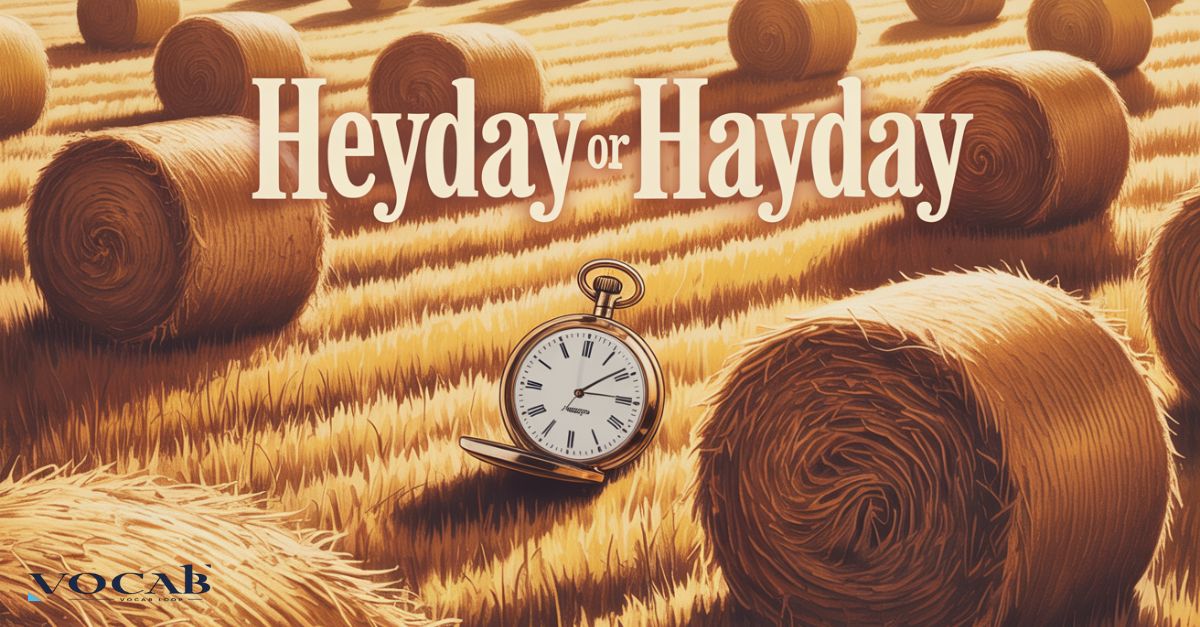Confusion in the English language is common, especially with words that sound the same but have different meanings. One of the most commonly confused words is “heyday” vs “hayday.” While both are pronounced the same, only one is correct.
This article will help you understand the difference between heyday and hayday, explain the correct spelling of heyday, and guide you through its history, meaning, and how to avoid mistakes.
What Does Mean of Heyday
The “heyday” definition refers to the time of greatest success or strength in a person’s life, career, or even an era. It shows the peak period when someone or something is at its best. For example, if a singer was most famous in the 1990s, that decade was their golden age—their heyday.
The heyday meaning comes from the idea of a high point or a popular era. It is often used in historical contexts, like saying, “That style was popular in the heyday of disco.” This term is widely used across many kinds of writing—news, books, and even in conversations.
What Does Mean of Hayday
You may have seen people use the word “hayday” online or in writing. The truth is, hayday is not a word. It’s a mistaken spelling of “heyday.” Many people assume it has something to do with hay or farming, but there is no real definition or use of “hayday” in formal English.
The English grammar clarification here is simple—only “heyday” is valid. The mix-up happens because hay is a real word, and combining it with “day” seems logical. However, this is just an example of how misspelled terms can cause confusion.
Quick answer
Heyday vs Hayday: Heyday is correct or Hayday is not a word.
Quick Summary between Heyday vs Hayday
The difference between heyday and hayday is all about correct word usage. “Heyday” is the correct and meaningful word. It shows the high point or time of greatest success. “Hayday” is just an error—a word that might look real but doesn’t exist in dictionaries.
Understanding this helps in avoiding commonly misused English terms. Always remember, “heyday” is the right word to use when talking about someone’s golden age or peak period in life or history.
Pronunciation of Hoodie or Heyday vs Hayday
Just like the word “hoodie,” “heyday” and “hayday” are homophones in English. They are pronounced the same: /ˈheɪ.deɪ/. This leads to pronunciation confusion because the ear can’t tell the difference.
This is why the mistake happens often. You might hear someone say “heyday” but write “hayday” instead. That’s why knowing the correct spelling of heyday is so important for writing well.
Spelling and Visual Cues of Heyday vs Hayday
One way to avoid the mistake is to look at the word closely. The word “heyday” starts with “hey,” which is a cheerful greeting in heyday. Think of someone shouting “Hey!” with joy—that matches the meaning of celebration or success.
Another tip is this: language tip: hey vs hay. “Hey” is used to get attention or show excitement. “Hay” is for feeding animals. So ask yourself, are you talking about a party or a farm?
Key Difference between Heyday vs Hayday

The biggest difference is that heyday is a real word with a real meaning. It talks about success, joy, and popular eras. On the other hand, hayday is not a word used in any formal or informal setting.
This shows how English language confusion can lead to wrong spelling. But once you know the correct word usage, it’s easy to get it right every time.
Comparison Table between Heyday vs HaydayHeyday vs Hayday
| Feature | Heyday | Hayday |
| Spelling | Correct | Incorrect |
| Meaning | Time of greatest success | None |
| Part of Speech | Noun | Not recognized |
| Usage | Formal and informal | Common error |
| Origin | 16th century interjection | No true origin |
| Pronunciation | /ˈheɪ.deɪ/ | /ˈheɪ.deɪ/ (same sound) |
| Spelling Status | ✅ Standard word | ❌ Not in dictionary |
Common Mistakes in Heyday vs HaydayHeyday vs Hayday
Many writers fall into this trap by typing what they hear. Because both sound the same, spelling errors slip through. Spellcheck may not even catch the mistaken spelling of “hayday.”
People also link “hay” with farming or sunny days, but that’s not what the word means. These are just examples of commonly misused English terms.
Formal vs Informal Usage of Heyday vs Hayday
The word “heyday” works in both casual and professional writing. You can use it in a business article or in a tweet—it fits well in any tone. It’s part of standard English vocabulary.
But hayday is not a word in any formal dictionary. You won’t find it in respected style guides either. So, avoid it completely when writing for work or school.
Usage in Different English Varieties Heyday vs Hayday

In both American and British English, the correct spelling of heyday is the same. There are no spelling variations in English for this term. Whether you’re in New York or London, “heyday” means the same thing.
“Hayday” does not appear in formal texts in any English dialect. It’s just a spelling error seen across the internet or in informal writing.
Simple Trick to Remember the Difference of Heyday vs Hayday
Here’s an easy trick: think of the word “hey!” That’s a shout of joy. So when something was at its best, it deserves a “hey!”—which makes it a heyday.
Imagine saying, “Hey, that was awesome!” That feeling of fun and success matches the word’s meaning. This memory trick works well to avoid spelling variations in English.
Examples in Sentences of each Heyday vs Hayday
Heyday in a Sentence:
- The band was in its heyday during the 80s.
- During his heyday, he won five championships.
- New York City saw its heyday in the roaring twenties.
- That car model’s heyday was in the early 2000s.
- The company thrived in its heyday.
- Fashion in the 70s was in its heyday.
- Her acting career reached its heyday in Hollywood.
- Radio had its heyday before TV took over.
- The tech boom marked Silicon Valley’s heyday.
- That video game was popular in its heyday.
Incorrect Examples Using Hayday:
- I miss the hayday of cartoons.
- During the hayday of disco, music was fun.
- She was a star in her hayday.
- That was the hayday of pop culture.
- We grew up in the hayday of gaming.
- In the hayday of TV, people watched every night.
- This brand had its hayday years ago.
- Hayday movies had better stories.
- It was the hayday of innovation.
- They ruled the league in their hayday.
Synonyms of each Heyday vs Hayday
Heyday:
- Prime
- Peak
- Zenith
- Golden Age
- Climax
- High Point
- Bloom
- Top Period
- Apogee
- Height
There are no real synonyms for “hayday” because hayday is not a word. Instead, people use it wrongly thinking it means “harvest day” or “farming season,” which are unrelated.
Origins of Heyday or Hayday
Heyday:
The word origin of heyday comes from the 1500s. It was used as an exclamation, like “Hey!” to show joy. It began as a cheerful greeting in heyday celebrations or surprises.
Later, the word started to mean a time of greatest success, especially when someone or something was thriving. This is a great example of language evolution.
Hayday:
There’s no history or word origin of hayday. It likely began as a simple spelling error. Because “hay” and “day” are both English words, people joined them thinking it made sense.
This is one of many commonly confused words in English. But remember, no matter the logic, hayday is not a word used in real English writing.
Fun Fact about Heyday vs Hayday
Here’s a fun twist—“Hay Day” is the name of a popular mobile farming game. That’s another reason why people get confused. They see the game name and assume “hayday” must be right.
However, in writing and speech, “heyday” is always the correct choice. This shows how modern culture can affect English vocabulary tips.
FAQ’s
What does heyday mean?
Heyday means the peak period or time of greatest success of someone or something. It describes the moment when something is most popular or at its best.
Is hayday a correct word?
No, hayday is not a recognized word in the English language. It is a common misspelled term due to pronunciation confusion but has no real meaning.
How do you pronounce heyday and hayday?
Both words sound the same, which leads to commonly confused words. The pronunciation is /ˈheɪdeɪ/, but only heyday is correct.
Can I use heyday and hayday interchangeably?
No, only heyday should be used to indicate a golden age or popular era. Using hayday is a spelling error and should be avoided.
What is an easy way to remember the difference between heyday and hayday?
Think of the word heyday starting with “hey,” like a cheerful greeting. This reminder helps you choose the correct spelling of heyday every time.
Conclusion
In the world of English grammar clarification, small changes in spelling can change everything. “Heyday” is a powerful word that speaks to success, joy, and growth. “Hayday” is just a mistake—a result of sound confusion and visual guesswork.
By understanding the difference between heyday and hayday, you can write with more confidence and clarity. Remember the correct spelling of heyday, use it wisely, and let this knowledge take your writing to its own heyday.

Alex Hormozi is a seasoned blogger at Vocab Loop, known for his deep insights into language, vocabulary, and grammar. With years of experience in writing, Alex shares practical tips and effective strategies to help readers improve their linguistic skills and enhance their writing abilities.

